Article not found
This article is no longer available. But don't worry—we've gathered other articles that discuss the same topic.

County approves $156,455 roof replacement and $86,160 partial hydronic snow‑melt installation for county facilities

Resident urges county action on alleged long-running hoarding and camper occupancy; county staff, sheriff and state’s attorney outline next steps

Votes at a glance: Pennington County approves annexation, liquor licenses, contracts and vouchers

